From holiday resort to guest house: internationals on quest to find housing
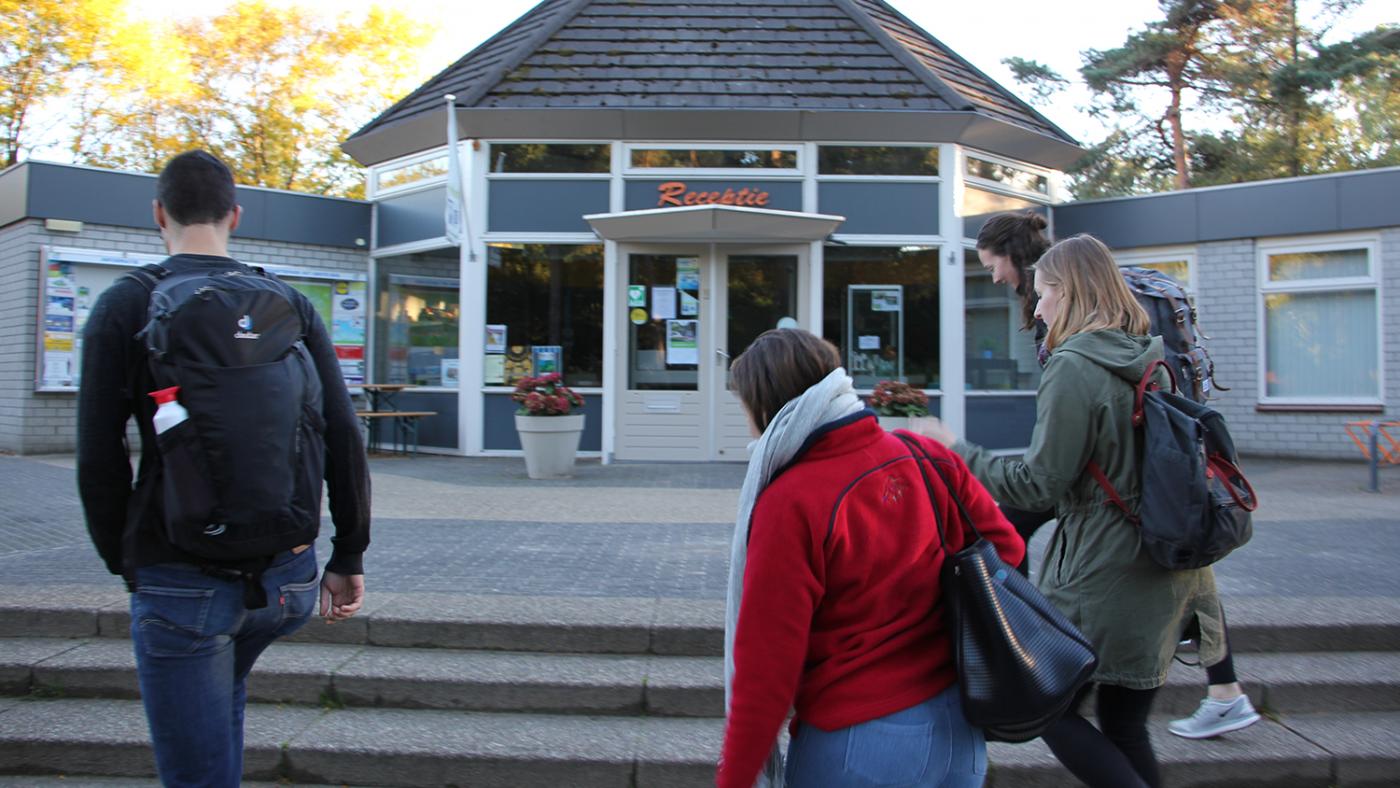
Several universities in the Netherlands are dealing with international students who can’t find rooms. The University of Groningen housed them on a campsite, and up until October 1st, Utrecht University supplied rooms in the youth hostel on the Neude and at a holiday resort at the Utrechtse Heuvelrug. DUB visited the internationals in Doorn in their final week there. Some had managed to find a new room just in time, but others were facing homelessness.
To the big forest
A large tour bus stops at an improvised bus stop at the Leuvenlaan. It’s the shuttle bus to holiday resort Het Grote Bos (‘the big forest’) in Doorn. It’s a quarter to six, and campus is slowly emptying out for the night. It’s pleasantly warm on the early autumn day, but a tall student in a black jumper still thinks it’s too cold to wear a t-shirt. He gets on the bus. I climb in after him. There are three other international students on the bus, who have had no choice but to make the holiday resort their temporary homes since the start of the academic year.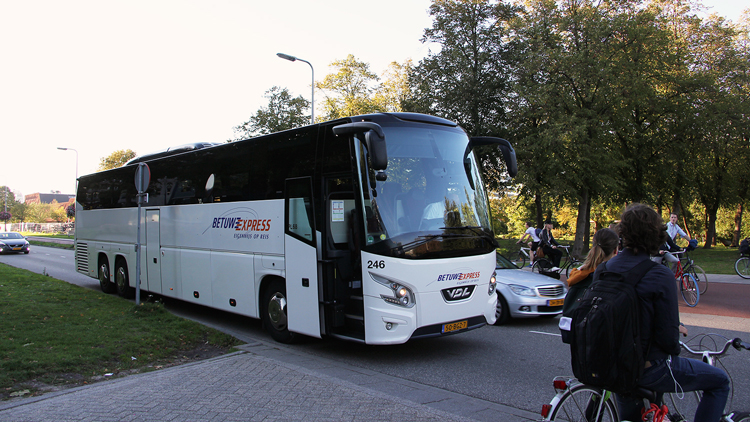
Dozens of seats on the bus remain empty. That’s definitely not always been the case, says Dominik, the student in the black jumper. “When we’d just moved into the resort in early September, the bus would usually have more than thirty people on it. As time progressed, more and more students found their own rooms.” The German student, who’s doing a Master’s programme in Sustainable Development, just found one himself. “From the SSH. I’m moving to De Uithof this weekend.” Just in time, too, because the contract between the university and the resort ends after the last week of September.
The bus starts to move. If we’re lucky, the trip will take about half an hour, Dominik says. “But we’re often stuck in rush hour, which means it’ll take twice as long. In the beginning, the bus drivers often struggled with the route. We were once dropped off at the wrong resort after an hour’s drive, and another time, we had to use Google Maps to help the driver find De Uithof.”
Too busy to enjoy
Rush hour or no rush hour, Texan student Sarah prefers the tour bus over public transport. “The bus stops are a fifteen-minute walk from the resort, so taking public transport takes over an hour.” A grocery bag filled with vegetables occupies the seat next to her. “It’s a 45-minute walk from the resort to the nearest grocery store, so I prefer to do my shopping in town.” As the bus only runs twice a day, students sometimes do choose to travel by public transport. “The bus goes to De Uithof at 8 am, and back at 6 pm, but the laundromat at the resort is only open between 9 am and 4 pm. So I’ll sometimes plan around the bus schedule.”
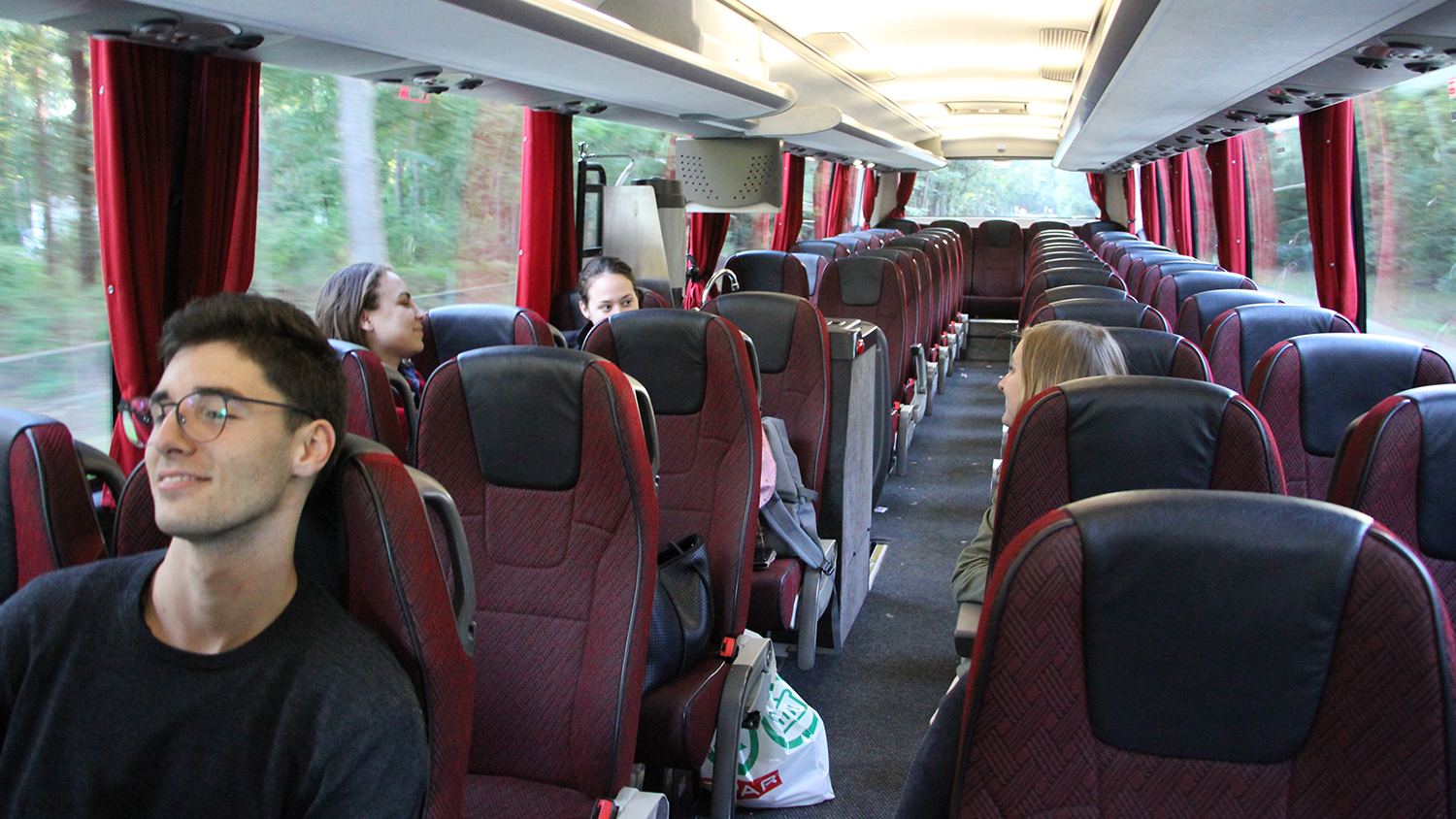 Within half an hour, the bus arrives on the resort’s parking lot. It’s surrounded by trees and we’re welcomed by a subtle pine scent. When I ask Sarah whether she likes living at the resort, a cloud passes across her face. “Do I like the resort? Yes. Do I like living here? Not really. Grocery shopping, the laundry, and the long commute all take a lot of time. The location, however, is absolutely beautiful.” A student from Dubai, speaking in a British accent obtained from years of British boarding school, agrees. “You’re in the middle of the forest here, and it’s always calm. Still, I’d prefer to have a place in the city.”
Within half an hour, the bus arrives on the resort’s parking lot. It’s surrounded by trees and we’re welcomed by a subtle pine scent. When I ask Sarah whether she likes living at the resort, a cloud passes across her face. “Do I like the resort? Yes. Do I like living here? Not really. Grocery shopping, the laundry, and the long commute all take a lot of time. The location, however, is absolutely beautiful.” A student from Dubai, speaking in a British accent obtained from years of British boarding school, agrees. “You’re in the middle of the forest here, and it’s always calm. Still, I’d prefer to have a place in the city.”
We walk past the reception and a restaurant. Two elderly couples are just starting their dinners. “I wouldn’t eat there if I were you,” she continues. “It’s rather expensive for students. By the way, we also have mini golf, several sports fields, and an open-air swimming pool. Sarah’s house even has a sauna.” Perfect for people on holiday, all those facilities, but the students don’t have the time to enjoy them, Dominik says. “I’ve swum once. I would’ve liked to go more often, but I just didn’t have the time. When I get home, I cook, study a bit, and go to bed early so I can make it to the bus in time the next morning. I go for a walk or a bike ride in the weekends sometimes, though.”
What do the students do with their spare time? “Cry,” Sarah grins. “I spend most evenings trying to find a room. I email organisations and reload Facebook pages so I’ll be the first one to see new posts. After my third interview for a room last week, I really did almost cry. At the end of the night, they told me they wanted a guy instead. Thankfully, I just found a room in Hoograven today!” The student from Dubai is hoping for good news from the SSH. “Many internationals find rooms through the SSH, but I haven’t had any luck so far. I’m at number 420 or something like that, all the way at the bottom of the waiting list.”
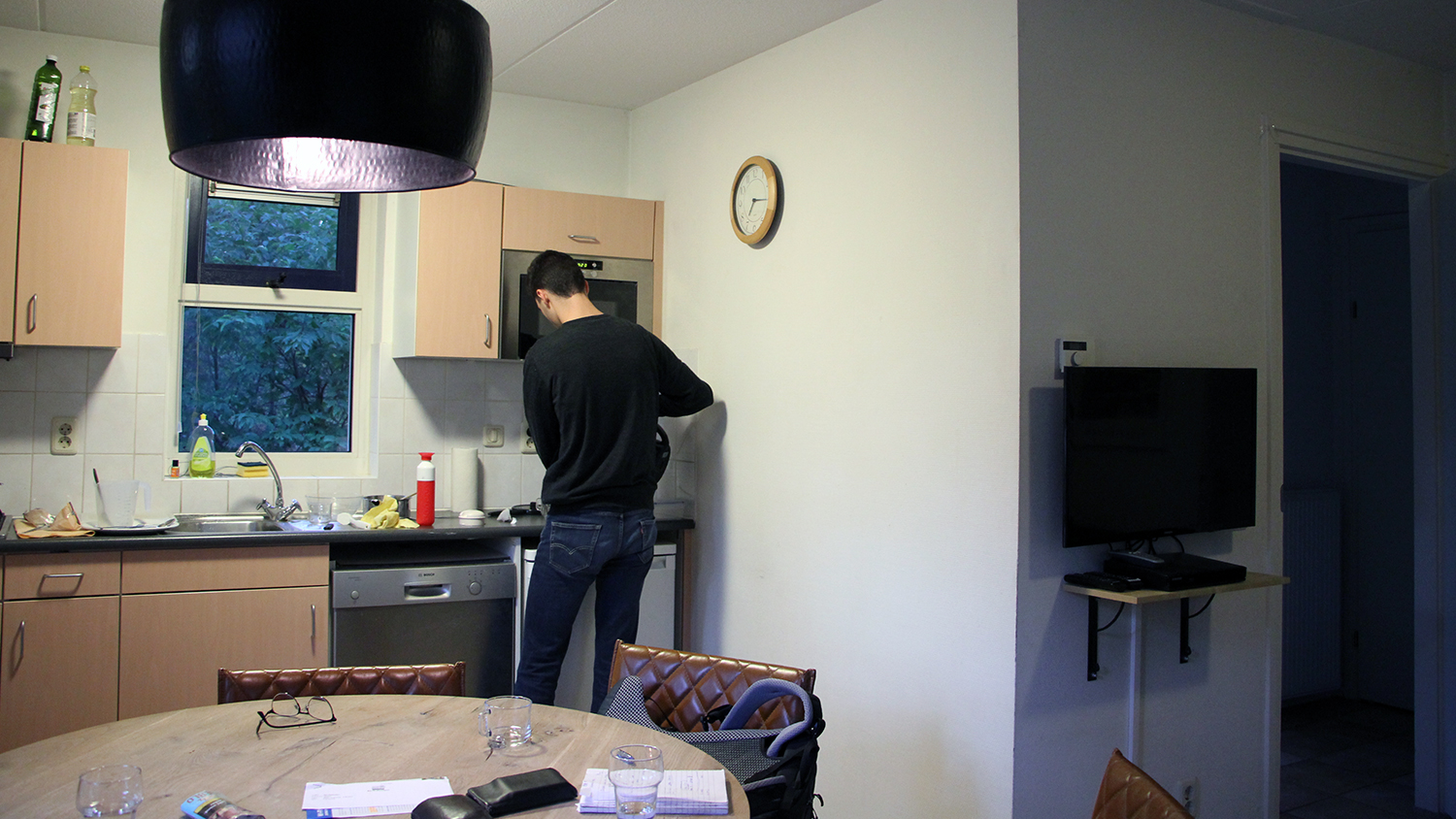 After a ten-minute walk through the forest, we reach the ten student houses, built around an empty parking lot. Most are empty now, Sarah says. “Of the forty students, less than half are still here. I’ve heard some of those want to rent one of these houses by themselves when we have to leave next week. I understand. It may be hard to travel to and from here, but at 300 to 350 euros per house, it’s not exactly expensive here.” The students all go to their own houses. Dominik invites me in for a tour around his.
After a ten-minute walk through the forest, we reach the ten student houses, built around an empty parking lot. Most are empty now, Sarah says. “Of the forty students, less than half are still here. I’ve heard some of those want to rent one of these houses by themselves when we have to leave next week. I understand. It may be hard to travel to and from here, but at 300 to 350 euros per house, it’s not exactly expensive here.” The students all go to their own houses. Dominik invites me in for a tour around his.
Treating the symptoms
His house is hidden behind a few birch trees, and looks exactly the same as all the others. “Don’t mind the mess, two of my housemates just moved out,” Dominik warns. The mess isn’t that bad. The beds are neatly made, the bedrooms as good as empty. “The Chinese and American students that were placed here with me both found rooms in the city. They were friendly, but kept to themselves. I like the student from Kazachstan who still lives here. We’re doing a city trip together soon.”
In the kitchen, Dominik fills the kettle. Like the kitchenware, the TV and WiFi are included in the rent. “I’m quite grateful to the university for this cheap place to live, but it still feels a little harsh. I’d read about the housing shortage before coming here, and I knew I’d end up at the resort, but I only really saw how bad it was after I’d gotten here. The resort is pretty neat, but it’s just treating the symptoms. The issue should really be fixed at the core: the housing shortage.”
With a tea pot filled with Russian Earl Grey, we move to the outdoor terrace. The day’s last sunbeams just manage to light the tops of the pine trees. The only sounds that fill the orange sky are birds and a distant car. The Sustainable Development student closes the door behind him to keep the heat inside. “You can’t preach sustainability if you don’t live by it,” he explains.
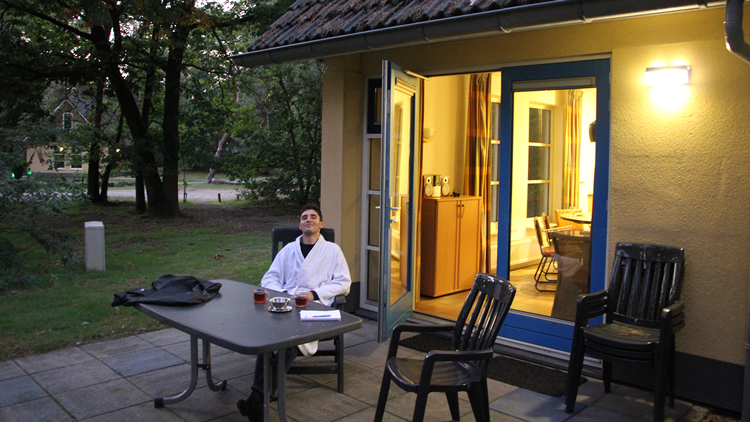 The conversation flows back to the topic of the housing shortage. It clearly bothers Dominik. “Social connections are incredibly important when trying to find a place to live. You can’t expect organisations like the SSH to just offer you a room. The Chinese student who lived here, for example, only found a room when the parents of another Chinese student who also lived at the resort bought a house for their child.” Students who come to study for only six months have the hardest time finding housing, he says. Worst case scenario, these internationals go back home after failing to find a place. “One Turkish guy who lived here gave up two days ago. He was an Erasmus exchange student and wanted to have a fun, interesting time here. So when you end up far away from the city at a holiday resort, and you try to combine your studies with finding a place to live, there’s not much room for that interesting time you were planning to have.”
The conversation flows back to the topic of the housing shortage. It clearly bothers Dominik. “Social connections are incredibly important when trying to find a place to live. You can’t expect organisations like the SSH to just offer you a room. The Chinese student who lived here, for example, only found a room when the parents of another Chinese student who also lived at the resort bought a house for their child.” Students who come to study for only six months have the hardest time finding housing, he says. Worst case scenario, these internationals go back home after failing to find a place. “One Turkish guy who lived here gave up two days ago. He was an Erasmus exchange student and wanted to have a fun, interesting time here. So when you end up far away from the city at a holiday resort, and you try to combine your studies with finding a place to live, there’s not much room for that interesting time you were planning to have.”
Additional rooms for internationals
The university knows several students have left. Spokesperson Maarten Post says it remains to be seen whether the housing situation is the cause of this. “Some of the students who have gone back home have received offers for rooms from the Housing Support Officer, for a room at UCU for example, or at a private home. They turned down the rooms, or didn’t respond. In the busy month of September, it’s not possible to have in-depth conversations about it, but we would like to know what we can do to help students through those uncertain times.”
The university is happy with the cooperation with the resort, Post says. “Thanks to the resort, at least we’ve been able to provide a temporary, affordable place to live to a number of students, so they’d at least have a starting point from which to start looking for a new room. We’ll evaluate how they liked their stay there, and we’ll see whether a similar agreement is possible for next year.” There’s no question about whether the housing shortage will remain an issue for a long time. The university wants to try everything they can to fight it, Post says. “We’re keeping an eye on all projects, and we’re expanding the number of reserved rooms as much as possible. We’re working on improving the interview options for internationals with the SSH. It’s also our wish that Dutch students going abroad on exchange offer their rooms for rent to incoming internationals. A semester in a student house in Utrecht can be a great experience for both the housemates and the foreign student.”
For the internationals who remain homeless, there is, at least, good news. “We’ve emailed 150 students with an offer for a room in a former guesthouse at the Dijnselburg estate in Zeist. The group who stayed at the bungalow resort is also eligible for those rooms. At the initiative of the new owner of the estate, 36 students can stay there for one or two semesters. We’re not exactly sure how many internationals are still looking for rooms, but for now, this new facility isn’t at full capacity yet.”